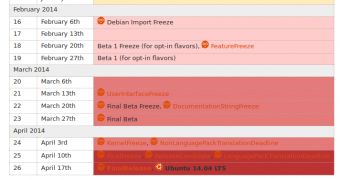Ubuntu 14.04 LTS (Trusty Tahr) still has a long way to go, but Canonical has just revealed some information about the packages that are going to be updated.
The development for Ubuntu 14.04 LTS started just a few days after the launch of Ubuntu 13.10 (Saucy Salamander). A Linux kernel has been chosen, but there are a lot of components that need to be upgraded.
Ubuntu's Sebastien Bacher has explained which important packages will be updated and what some of the choices for the new operating system are.
GLib will be upgraded to a new version, 2.40, which was to be expected. Canonical has maintainers for this package and an update was the logical choice.
WebKit will also be updated, mostly because a lot of other projects depend on it. According to the developers, there is a Software Center important bug, but that will probably get ironed out.
Another major decision is the adoption of GTK 3.8. Although a lot of people have been hoping to get GTK 3.10 support in Ubuntu 14.04 LTS, the 3.8 branch is the chosen default. The good news is that this version is not set in stone and the developers might shift to 3.10 later in the cycle.
Also, GNOME 3.8 will be kept from Saucy Salamander. The packages are stable and they don't require any extra work. Ubuntu 14.04 is an LTS release, so this is probably for the best.
The last part is also the most important. Canonical is now considering adopting “GNOME style” apps.
“The new ‘GNOME style’ (having no menubar/using GtkHeader/client side decoration) doesn't work well under non gnome-shell desktops. We only have a few of those so far and we plan to make them more integrated in Unity again.”
“We are going to add menubars back to e.g evince, gnome-calculator, nautilus, etc (the plan is to upstream those patches, and to make the menubar be displayed in a conditional way depending of the environment, that's what is done already in gedit),” said Sebastien Bacher in the mailing list.
These are all very interesting choices for Canonical, and a lot of users will be very happy, not to mention some of the developers. We'll keep you apprised of any changes that appear along the way.

 14 DAY TRIAL //
14 DAY TRIAL //